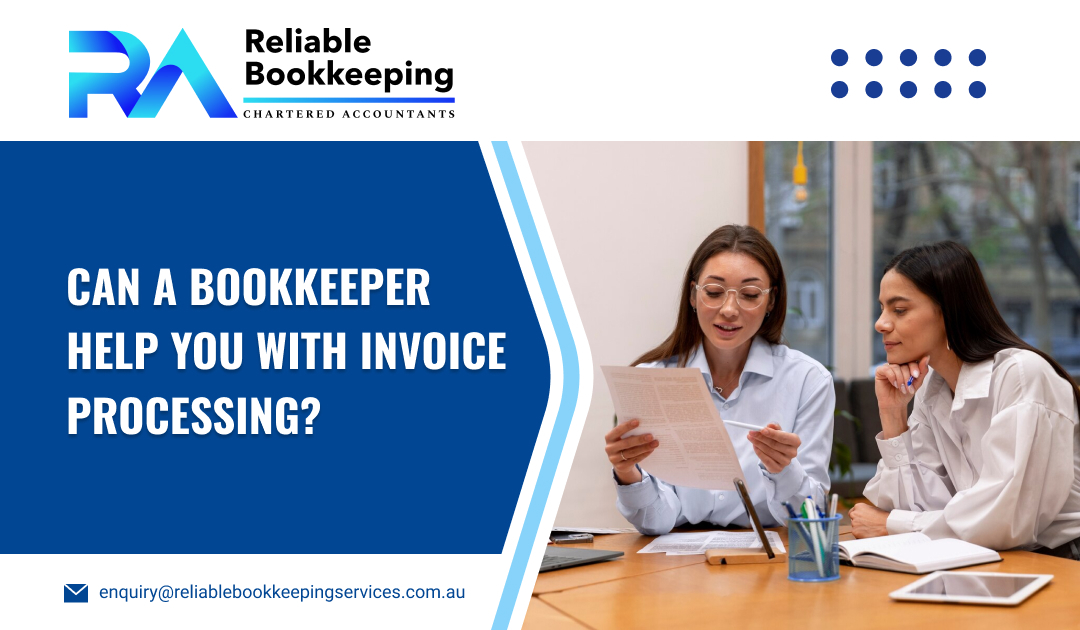Invoice processing is a crucial element of a business which involves the whole process of receiving, approving and making payments for the invoices received from the business vendors. Any mistakes or delays in invoice processing can affect the business’s relations with suppliers. You can get bookkeeping services for small businesses to ensure invoice processing is accurate, efficient, and on time. In this blog post, we’ll discuss the steps involved in invoice processing and how a bookkeeper can help you with invoice processing.
What is invoice processing?
Invoice processing indicates the process of dealing with the invoices released by the supplier or vendors from the issuance to payment to recording in the business books. Bookkeepers can help you manage accounts payable. Regardless of how you receive the invoice, whether digitally or manually, it’s crucial to track it accurately, verify it and make payments on time. Business can manage their accounts payable by seeking help from a professional bookkeeper.
What are the steps involved in invoice processing?
Managing accounts payable needs a step-by-step process for increased accuracy in the business books and making payments on time. It’s vital to set a workflow for invoice processing to ensure accuracy throughout the invoice processing. Here is the simple process for invoice processing:
- Receiving and examining invoices
Invoice processing starts by receiving an invoice from business vendors. It’s crucial to verify the invoice against the purchase order and goods or services must have been delivered under the contract. Verification can prevent delays or overpayment.
- Recording invoices
After verification, it’s essential to record invoices in bookkeeping software. It will help you keep liability records accurate and updated. The most commonly used bookkeeping software like Xero, Myob, and QuickBooks are used for streamlining data entry while monitoring due dates.
- Payment scheduling
These payment schedules will follow the terms set by the supplier. By adhering to these schedules, businesses can avoid late fees and, in some cases, take advantage of early payment discounts.
- Accounts payable reconciliation
Accounts payable reconciliation is a vital process to verify that the recorded accounts payable align with the actual financial obligations incurred. It helps identify and resolve discrepancies, preventing fraud and ensuring the accuracy and reliability of the accounts payable ledger. This process enhances transparency in the financial position and supports effective cash management. Usually, you have to reconcile your bank accounts to ensure accuracy and consistency in your accounts and for this, you can use the services of bank reconciliation in Melbourne for your business.
Completing all these steps and maintaining accuracy requires significant time and resources. By seeking help from a bookkeeper for invoice processing, businesses can save both, freeing up valuable time and resources for other critical activities.
When do you need to hire a bookkeeper?
When you’re launching your business, it’s a good idea to engage a bookkeeper right from the start. A bookkeeper can offer valuable guidance and services that will influence how you structure and set up your business.
Rather than making financial and operational decisions on your own, it’s wise to consult a bookkeeper early on. They can help you avoid costly mistakes before they happen, saving you from the need to make major adjustments later on. Bookkeepers pay attention to financial transactions and are responsible for tracking the day-to-day operations of a business. A bookkeeper is responsible for performing the following tasks:
- Collaborate with taxation accountants to prepare and provide guidance on tax returns
- Managing general ledgers
- Offering advice on BAS, payroll, and superannuation
- Analysing cash flow and suggesting improvements
- Performing data entry and ensuring accurate bookkeeping
- Generating monthly financial reports
- Managing accounts receivable and payable
- Conducting bank reconciliations
- Advising on accounting software
- Monitoring and tracking expenses
- Ensuring ATO compliance and producing reports
- Handling invoicing and receipt management
Conclusion
It’s essential to consider the management of accounts payable in your business to enhance the financial stability of your business. Getting Reliable Bookkeeping Services for managing accounts payable and receivable will eliminate errors and free resources for core business activities.

